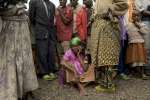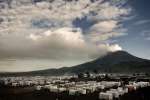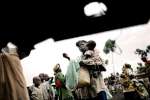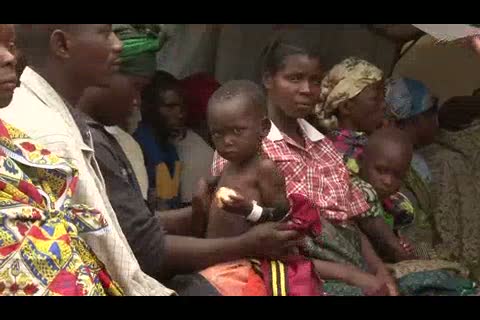- Text size
 |
|  |
|  |
| 
- Français
UNHCR completes challenging repatriation of almost 120,000 Congolese refugees
Making a Difference, 5 August 2014
KINSHASA, Democratic Republic of the Congo, August 5 (UNHCR) – The UN refugee agency has successfully completed the voluntary repatriation to the Democratic Republic of the Congo (DRC) of almost 120,000 refugees from neighbouring Republic of Congo.
Local boats last Wednesday took the final 81 Congolese refugees across the Oubangui River from the town of Betou in Republic of Congo to reception centres run by UNHCR in the Equateur province towns of Siforco, Izato and Dongo.
Their return marked the end of five years in exile. They were among some 160,000 people who fled to neighbouring countries – 140,000 in Republic of Congo and 20,000 in the Central African Republic – when clashes erupted in 2009 between the Munzaya and Enyele communities over traditional fishing rights.
Under a challenging repatriation operation launched by UNHCR in May 2012, a total of 119,000 were ferried home across the river from the isolated areas they had been living in along a 600-kilometre stretch of the Oubangui, which marks the border between Republic of Congo and the DRC.
The last group of returning refugees were welcomed back last week by Congolese authorities and local residents as well as UNHCR and its partners. Upon their arrival, UNHCR and the government provided returnees with identity documents, information on reintegration assistance, HIV/AIDS awareness training and medical help. UNHCR also gave returnees a cash grant for travel to their final destinations and to help them settle.
Once home, returnees benefit from reintegration programmes that provide health care, education, shelter kits, income-generation programmes and drilling of boreholes for water. There are also awareness campaigns to promote peaceful coexistence between communities, including a community radio station in the town of Dongo.
But these modest programmes may not be enough to ensure the stability of this region. Without the further involvement of local and national authorities, as well as the engagement of development actors UNHCR fears that this remote and underdeveloped region remains vulnerable to further conflict over scarce resources.
Since the launch of the voluntary repatriation operation in May 2012, UNHCR organized 416 riverine convoys from the Republic of Congo to Equateur province. While 119,000 DRC refugees opted for repatriation, about 23,000 chose to stay in the Republic of Congo. The return of the 20,000 DRC refugees from CAR concluded in May this year. An additional 100,000 Congolese had also been displaced inside Equateur province, but most returned home in 2011 when conditions improved.
More than 430,000 Democratic Republic of the Congo citizens are still refugees in neighbouring countries, mainly in Uganda, Rwanda, Tanzania and Burundi.
DRC's Equateur province is also hosting more than 64,000 refugees from the Central African Republic, who have been arriving in the DRC since December 2012, with new arrivals registered every week.
By Céline Schmitt in Kinshasa, Democratic Republic of the Congo














































